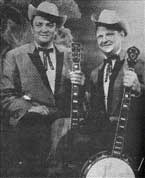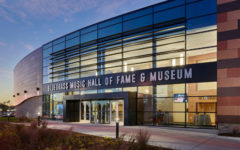This post is a contribution from Richard Thompson, a founding member of the British Bluegrass Music Association. He is also a longstanding contributor to British Bluegrass News, a quarterly print publication where he also briefly served as editor. He wrote the Roots & Branches column for International Country Music News for some years, and is now preparing a factbook (catalog of important events) on the life of Bill Monroe.
 Today marks the 40th anniversary of Carter Glen Stanley’s passing in a Bristol, Tennessee hospital. He was just 41 years old. As Ricky Skaggs comments below, it is hard to appreciate that forty years since Carter Stanley succumbed to an illness that had been troubling him for a while.
Today marks the 40th anniversary of Carter Glen Stanley’s passing in a Bristol, Tennessee hospital. He was just 41 years old. As Ricky Skaggs comments below, it is hard to appreciate that forty years since Carter Stanley succumbed to an illness that had been troubling him for a while.
Despite such a passage of time Carter Stanley’s music can be enjoyed well onto the 21st century and beyond. A brief glance at the Fresh Sounds In The World Of Bluegrass column in the latest edition of the IBMA newsletter, International Bluegrass, will reveal that Carter Stanley’s name is noted twice as the source of songs on recent recordings by Dave Evans and Carrie Hassler & Hard Rain. This is indicative of a bluegrass legacy that has really stood the test of time.
We have asked a number of people to share their thoughts about Carter Stanley. I should like to thank them all for their contribution and we must acknowledge particularly the help that James Alan Shelton and Jeanie Stanley have provided during the course of compiling this tribute to Carter Stanley.
Current lead guitarist for the Clinch Mountain Boys, James Alan Shelton, who wrote in the October edition of Bluegrass Unlimited about Carter Stanley’s last full show – at Bean Blossom, October 16, 1966 – has admired Carter Stanley from afar.
“To me, Carter Stanley was the greatest natural lead singer who ever lived. He sang right on pitch and his song writing was second to none. As the front man and emcee for the Stanley Brothers he always had a way of saying just the right thing to introduce a song, or maybe tell a joke or a story about the songs to keep the show moving along. He was also a good rhythm guitar player. By all accounts he was a highly intellectual person, a deep thinker, who was on a different level than most people. I felt like he carried himself with a lot of class. My only regret is that I never got to meet him. But by first hand accounts from people who did know him, I think he would have been a friend.”
 Ricky Skaggs, along with the late Keith Whitley, grew up singing Stanley Brothers songs. In one notable incident, the duo were invited on stage to cover for a delayed Ralph Stanley, who, when he heard them, was so impressed with their renditions of classic Stanley Brothers’ songs that he invited them to join the Clinch Mountain Boys when they were old enough to go on the road. Ricky and Keith made several recordings with and without Ralph. As they say, the rest is history. But Carter Stanley is far from history as far as Ricky Skaggs is concerned.
Ricky Skaggs, along with the late Keith Whitley, grew up singing Stanley Brothers songs. In one notable incident, the duo were invited on stage to cover for a delayed Ralph Stanley, who, when he heard them, was so impressed with their renditions of classic Stanley Brothers’ songs that he invited them to join the Clinch Mountain Boys when they were old enough to go on the road. Ricky and Keith made several recordings with and without Ralph. As they say, the rest is history. But Carter Stanley is far from history as far as Ricky Skaggs is concerned.
“It’s hard to believe that it’s been 40 years since the passing of Carter Stanley. I just listened to him sing ‘Angel Band’ just last night on my iPod. I just saw a great picture of him and Ralph with Joe Meadows and Bill Lowe from ’55 in this months BU. His music is still so important in Bluegrass. He was a song writers’ song writer, such a great MC on stage, he had everything it took to be a superstar in his Genre. I can only imagine how Ralph has missed him all these years. But Ralph did the only thing he could do. He went on! Thank God he did. What a testament to this music that we all love, Stanley Brothers music. It’s real, it’s honest, it’s from the heart and soul, it’s the sounds of heaven. Rest well Carter, we all love what you left us, and I’ll see you again someday.”
Charlie Sizemore was lead singer with the Clinch Mountain Boys for about nine years from shortly before his 17th birthday in November 1977. Subsequently he formed his own band and has released praiseworthy albums on Old Homestead and Rebel Records.
“I saw Carter Stanley only once – in the late winter or early spring of ’66 at the Salyer Elementary School in Royalton, KY. I was five years old then, but I do remember being excited about seeing the Stanley Brothers. I recall telling my father that I didn’t know there were three Stanley Brothers. He replied: That’s Melvin Goins playing the bass. (There was only a three piece band at that show.) I got Carter’s autograph that night. I still have it.
You need to understand that where I grew up in Eastern KY, the Stanley Bros. were a huge deal. Much more so than Monroe or Flatt and Scruggs. Being drawn to music and having a houseful of Stanley Bros. records at my disposal, I had learned most of their songs mostly by osmosis before I finished elementary school. My brother John and I used to set up a fake microphone and pretend to be the Stanley Brothers.”
Big Stanley Brothers fan Dudley Connell credits Carter Stanley as the major reason why he became a bluegrass musician.
“It was Carter Stanley’s distinctive and emotive voice than inspired me to want to sing bluegrass. Carter could sing “Pig in a Pen” and make you feel sorry for the pig. No one before or since has had such an influence on my singing or what I look for in a singer. In my opinion, he was/is simply the best. I once asked Bill Monroe who was his favorite lead singer in the history of the Blue Grass Boys. His answer, “Well, Carter Stanley was the best natural lead singer I ever had”. Enough said. Enough said.”
Legendary banjoist from Maggie Valley, North Carolina, Raymond Fairchild has often spoken affectionately of Carter Stanley and speaks highly of him here with this brief but heartfelt testimonial..
“Carter Stanley was a master of his art, picking and singing mountain music. He was among the best song writers I ever knew. Carter played rhythm guitar with thumb and finger picks and he sang lead from his heart, and he also was among the best MC’s of his day. Carter Stanley had it all, a god-given talent and one in many that could do it all, and do it right. Forty years has passed since his death. There will never be another Carter Stanley. Still missing you Carter.”
 After Carter Stanley’s death brother Ralph turned to Larry Sparks to take on the role of guitarist and lead singer in the Clinch Mountain Boys. This was a job Sparks had for about three years before he went on to form his own band. Here Larry Sparks remembers some earlier times with both Stanley brothers.
After Carter Stanley’s death brother Ralph turned to Larry Sparks to take on the role of guitarist and lead singer in the Clinch Mountain Boys. This was a job Sparks had for about three years before he went on to form his own band. Here Larry Sparks remembers some earlier times with both Stanley brothers.
“I played some shows with Carter Stanley in 1965-66. I can remember him as being one of the best stage leaders ever. He knew what to sing, how to sing it and how to entertain his many fans. I think Carter was no doubt the most heartfelt singer in bluegrass up until his death in 1966. He gave to this music what it needed. I treasure getting to know him for a little while.”
For an international perspective on Carter Stanley, I asked Barry C Lane, an English friend, who has a long history of involvement in the British bluegrass music scene, for his thoughts about Carter Stanley
“I remember the day I walked in to ‘Greenwood Record Sales’ shop in Bradford. It was a dull, cold, damp day and I was looking to see what new bluegrass LPs my friend ‘Goff’ [Greenwood]had received into stock. The day was not brightened up by the sight of any new goodies but more the opposite, as Goff related that Carter Stanley had died.
I had missed seeing them in London earlier in the year as the grapevine on the folk club circuit only told me that the Stanley Brothers had played, the week after the event. Now it was December and the loss was all the more intense. I didn’t realise he was even ill in those pre ‘Bluegrass Unlimited’ days.
I had been playing guitar and singing, with Ray Hipworth doing the banjo… and he could do that sort of octave staccato lick that Ralph used so often. We tried doing the Stanley Brothers songs but it never sounded right, for the brothers had a harmony which was all their own. I could mimic Carter (badly) but neither of us could emulate the tenor of Ralph. We missed their sound by miles! There have been very few in the UK who could get anywhere close to the Stanley sound.
My great sorrow on hearing the news of Carter’s death was that the Stanley Brothers unique sound would be lost for ever. We were not favoured with many available records by the Stanley Brothers in the mid 1960s but the brothers had recorded so much material that I have spent the last forty years catching up on the stuff and although the Stanleys and Ralph’s later work greatly out number albums by any other artist in my collection, there are still a few titles that I haven’t got. It was only relatively recently that video of the brothers could be added to the records. It all shows how much I still miss Carter after all these years.”
 I don’t think anybody would disagree with me when I say that Gary Reid is the premier authority on the Stanley Brothers’ music. He has written notes for recordings by the Stanley Brothers for each era of their recording career. Additionally, he has compiled two four-CD boxed sets of Stanley Brothers’ Starday and King recordings and, through a series of live recordings, Reid has issued a selection of concert recordings from a number of their personal appearances made during the duo’s heyday.
I don’t think anybody would disagree with me when I say that Gary Reid is the premier authority on the Stanley Brothers’ music. He has written notes for recordings by the Stanley Brothers for each era of their recording career. Additionally, he has compiled two four-CD boxed sets of Stanley Brothers’ Starday and King recordings and, through a series of live recordings, Reid has issued a selection of concert recordings from a number of their personal appearances made during the duo’s heyday.
“Having recently celebrated my 50th birthday, it’s amazing to me to look back and realize that I’ve been enamoured with the music of the Stanley Brothers for 33 years. I discovered their music, and the music of Bill Monroe and Flatt & Scruggs, by accident, while sifting through stacks of albums that a high school instructor had loaned me ‚Äì things have never been the same since!
Although I was exposed to a lot of different performers in the field of bluegrass, it was the music of Carter and Ralph Stanley that has stuck with me the most over the years. As a team, they were ‚Äì in my book ‚Äì hard to beat. It’s hard to articulate in words the emotional power of their music that makes it so compelling. I had occasion to speak with Bud Reed a year or so ago ‚Äì he was the husband of the late Ola Belle Reed and a partner in the legendary 1950s country music park known as New River Ranch. As someone who witnessed many of the top acts in the music during the genre’s golden era, it was a strong statement on his part when he said, quite simply, that Carter Stanley was the best lead singer he’d ever heard.
The qualities of the duo have been noted a lot of times‚Ķ the sincerity of their vocals and the blend they achieved with their harmonies, the tender themes of love, loss, and sorrow in their songs, and the instrumental prowess that each of the brothers achieved on their respective instruments. In addition to the 500 or so songs that the duo recorded, I’ve collected numerous hours of live concert recordings and interviews ‚Äì in the process, I’ve been struck by the genial nature of their delivery on stage. Carter’s MC work was always personable as he related to the audience tidbits about the songs they performed.
As far as anniversaries go, I wish this was one that we didn’t need to remember or honor ‚Äì certainly not that Carter Stanley isn’t worthy of our adoration. Rather, I wish the guy was still around so that I’d have had the chance to know and appreciate him in person. As much as I’ve read about and enjoyed Ralph Stanley’s music over the years, being able to know and connect with him is far more meaningful and insightful than learning about him second-hand.
In any event, I’ve enjoyed coming to know Carter Stanley as best as I’ve been able to do. I look forward to coming to know him better as the years roll on. If his rewards here on earth were not what they should have been, hopefully he can take comfort in the fact that a growing legion of people continue to discover and admire his artistry. It’s probably safe to say that his popularity and sphere of influence is greater today than it was in the twenty years of his professional life. It’s been an honor to have played a small part in helping to keep his legacy alive and growing.”
Editor’s note: Richard Thompson is due our thanks and admiration for compiling these remembrances of Carter Stanley, whose contributions as a singer and songwriter represent some of the most precious gifts we have received since the birth of bluegrass music.




